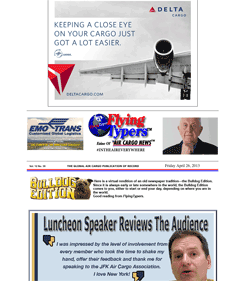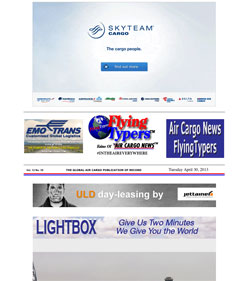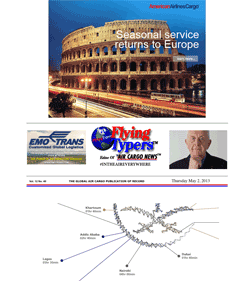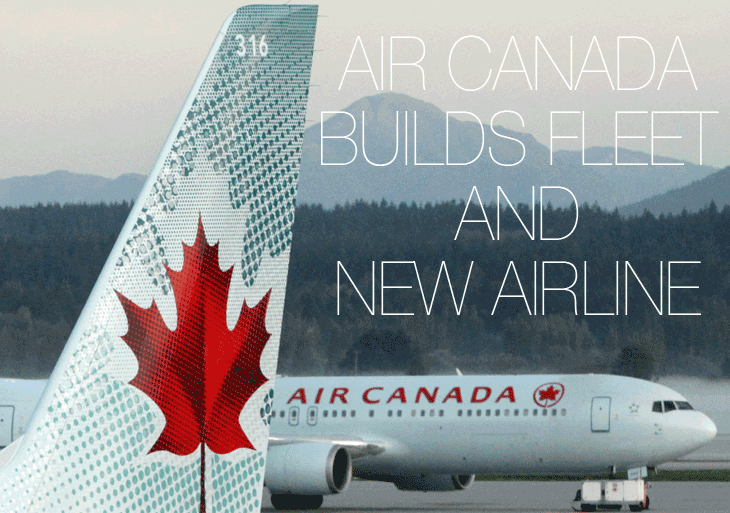
Air
Canada has been Canada's largest
airline and flag carrier since
1936.
With
a major cargo hub at Toronto
Pearson International Airport
in Ontario, the carrier’s
main base is Montreal-Pierre
Elliott Trudeau International
Airport in Quebec.
Air
Canada is a founding member
of Star Alliance and its cargo
division has long had a reputation
for service excellence and innovation,
something we can attest dates
back to the days of Mike Scullion,
who led the charge during the
1970s, to the long tenure of
Claude Morin, who moved from
cargo upward at Air Canada.
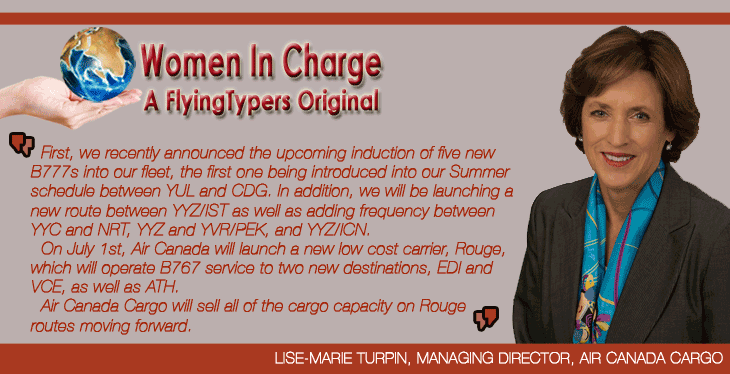 |
 oday Air Canada Cargo has the
distinction of being led by
a woman, Lise-Marie Turpin.
oday Air Canada Cargo has the
distinction of being led by
a woman, Lise-Marie Turpin.
In fact, as Managing Director
of Air Canada Cargo, Lise-Marie
is the highest-ranking female
air cargo leader in the Americas.
Lise-Marie Turpin was appointed
Managing Director of Air Canada
Cargo in September 2008.
She is responsible for all aspects
of the cargo business for Air
Canada.
Lise-Marie
was previously responsible for
the cargo operation system-wide
as Senior Director, Cargo Services.
Since
joining Air Canada in 1995,
she has held a number of management
positions including General
Manager, Passenger Sales Europe,
responsible for all sales generated
in Europe, as well as Manager,
Passenger Sales France, Spain,
and the Benelux, and Manager
Passenger Sales, Quebec.
Prior
to joining Air Canada, Lise-Marie
held a number of management
positions at Air France –
Canada, in both Passenger and
Cargo divisions.
Lise-Marie
holds a Bachelor of Arts degree
in Humanistic Studies from McGill
University.
As
IATA Cargo Network Services
Partnership Conference 2013
takes off today in Phoenix,
we asked Lise-Marie to share
some thoughts about the year
thus, far and what lies ahead
for Air Canada Cargo.
“Q1
has been challenging, as air
cargo traffic remains soft,
while up until now, passenger
traffic has been relatively
strong, resulting in a context
of over-capacity in most markets.
“No
big surprises (markets, etc.),
but we have felt some disappointment
that Asia to the Americas traffic
has not shown any signs of strengthening.
“To
date, 2013 is very similar to
2012.
“Let’s
hope that we will see an improvement
in traffic toward the latter
part of the year, as some predict.
“In
terms of where we want to to
be with your business, Air Canada
Cargo always wants to be ahead.
“But
2013 did not start off quite
as planned.
“Having
said that, we have seen some
positive signs in April.”

“We
have quite a bit of good news.
“First,
we recently announced the upcoming
induction of five new B777s
into our fleet, the first one
being introduced into our Summer
schedule between YUL and CDG.
In addition, we will be launching
a new route between YYZ/IST
as well as adding frequency
between YYC and NRT, YYZ and
YVR/PEK, and YYZ/ICN.
“On
July 1st, Air Canada will launch
a new low cost carrier, Rouge,
which will operate B767 service
to two new destinations, EDI
and VCE, as well as ATH.
“Air
Canada Cargo will sell all of
the cargo capacity on Rouge
routes moving forward.”

“We
have some excellent partnerships
with a number of carriers around
the globe.
These
are principally based on interline
agreements. For example, we
look forward to further developing
our relationship with Etihad
in a way that makes sense for
both of us.”

“I
believe that there is a genuine
willingness to pull together
as an industry to confront our
realities, be they regulatory,
climatic, or economic in nature.
“There
appears to be consensus on the
need for change, the need to
improve our service offering
vs. other modes of transportation.
“It
is now acknowledged that much
can be achieved by embracing
e-commerce and working through
the basics to improve our speed
of processes.”

“International
traffic represents approximately
85 percent of our business,
which is in line with our wide-body
fleet deployment.
“As
new aircraft come into our fleet,
new markets will be opened.
“Traffic
within North America accounts
for approximately 15 percent
of our business.
“Having
said this, both sales to/from
Canada and the U.S. to/from
international markets via our
hubs in YYZ, YVR, and YUL are
important to our success
“Air
Canada flies to over fifty destinations
in the U.S., largely with narrow
body aircraft. However, we do
operate some wide body capacity
into LAX, which is supported
by the perishables market.
“We
also have a very good trucking
network to satisfy our customers’
air cargo needs.
“The
U..S is an important market
for us both inbound and outbound.
“At
the moment, traffic is stable.”

“With
the introduction of the B787s
into our fleet beginning in
Q1 of 2014, we can expect to
see our expansion in the Americas.
“There
are definitely interesting markets
in South America that we are
eager to develop, especially
when we will have the appropriate
aircraft type to deploy on a
year round basis.
“Air
Canada Cargo has an excellent
worldwide network, which is
further expanded through our
extensive trucking network and
solid partnerships with our
interline partners.
“We
can flow traffic quickly, reliably,
and efficiently through our
hubs in YYZ, YVR, and YUL.”
“It
should also be said that Air
Canada Cargo has an extensive
global reach deserving consideration
when moving shipments beyond
Canada.”
Geoffrey/Sabiha
|



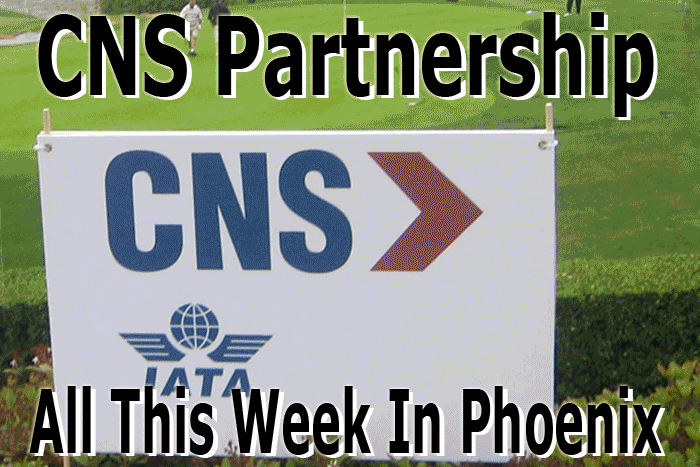



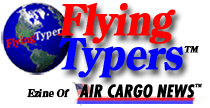
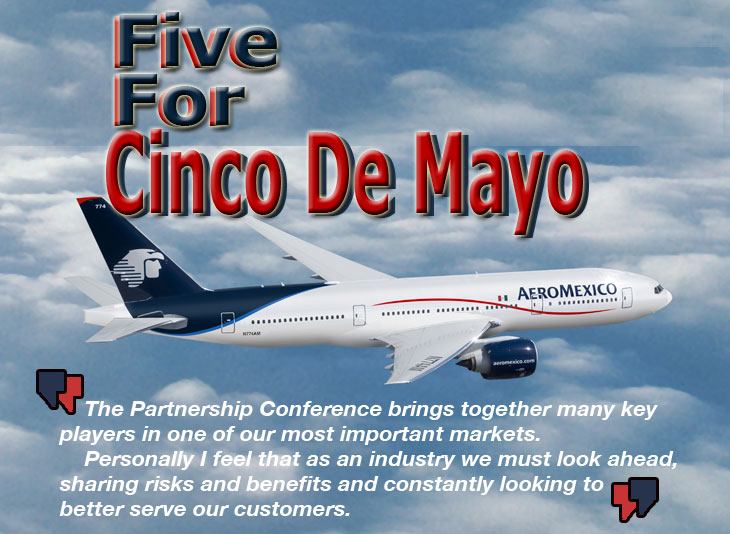
 n
the opening day of the
IATA CNS Partnership Conference,
“Five For Cinco
de Mayo Aeromexico"
affords us an opportunity
to go “up close
and personal” with
Mauricio Nieto CEO of
Aeromexico Cargo.
n
the opening day of the
IATA CNS Partnership Conference,
“Five For Cinco
de Mayo Aeromexico"
affords us an opportunity
to go “up close
and personal” with
Mauricio Nieto CEO of
Aeromexico Cargo.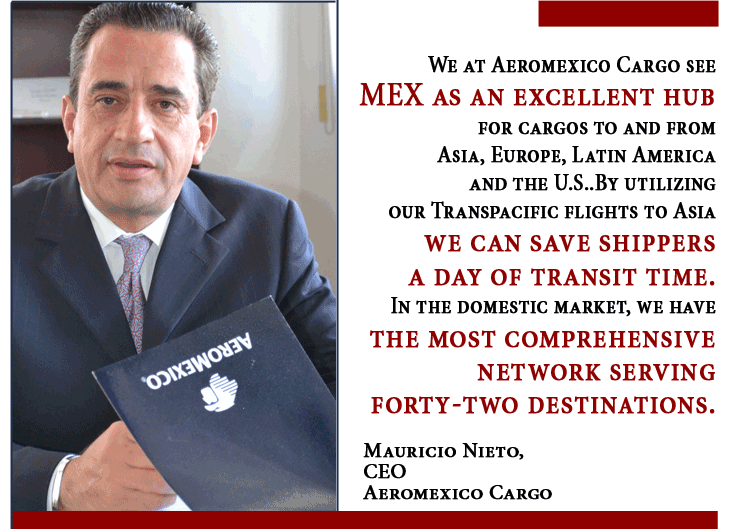
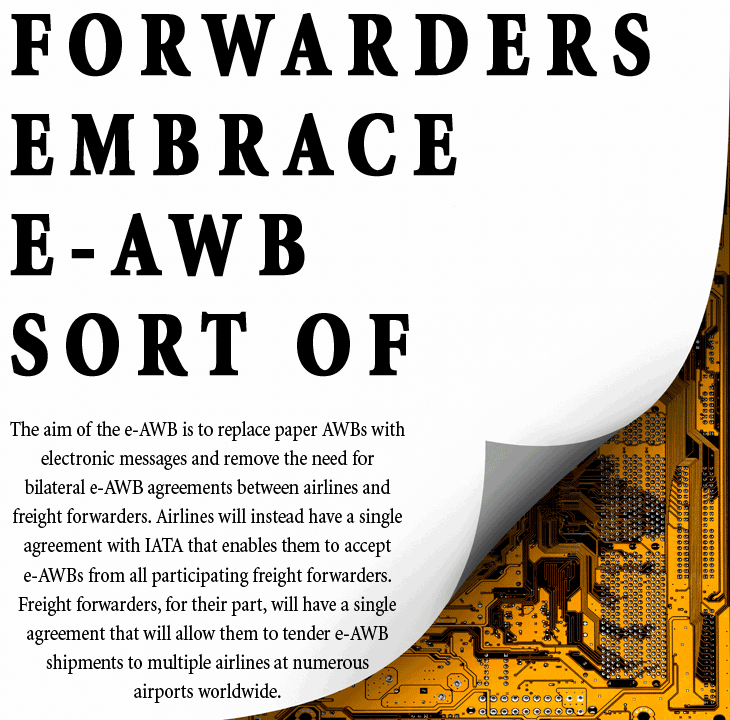
 orwarders
are ready to embrace the new
Multilateral electronic Air
Waybill (e-AWB) standard agreed
by the International Federation
of Freight Forwarders Associations
(FIATA) and IATA earlier this
year, although some believe
it will favor larger logistics
operators.
orwarders
are ready to embrace the new
Multilateral electronic Air
Waybill (e-AWB) standard agreed
by the International Federation
of Freight Forwarders Associations
(FIATA) and IATA earlier this
year, although some believe
it will favor larger logistics
operators.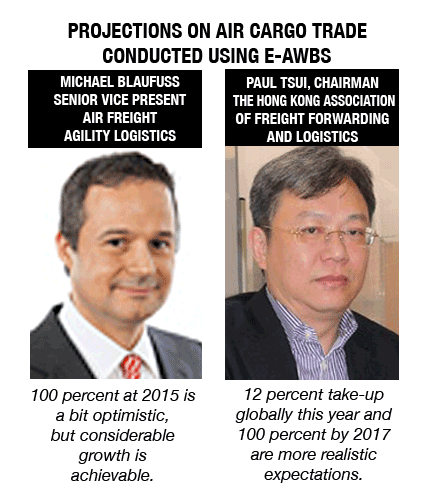 “I
think this is good for everyone,
including airlines and forwarders,”
said Paul Tsui, chairman of
the Hong Kong Association of
Freight Forwarding and Logistics.
“Previously, forwarders
and airlines had to spend substantial
resources and time to review
bilateral e-AWB agreements.
“I
think this is good for everyone,
including airlines and forwarders,”
said Paul Tsui, chairman of
the Hong Kong Association of
Freight Forwarding and Logistics.
“Previously, forwarders
and airlines had to spend substantial
resources and time to review
bilateral e-AWB agreements.

 oday Air Canada Cargo has the
distinction of being led by
a woman, Lise-Marie Turpin.
oday Air Canada Cargo has the
distinction of being led by
a woman, Lise-Marie Turpin.
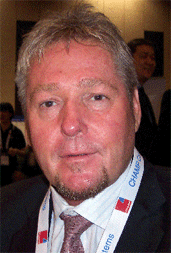 Additionally,
Urs Wiesendanger, (right) Air
Canada Cargo Network Control
– ULD Logistics and Vice
President ULD CARE will speak
at the IGHC to elaborate how
ULD CARE will expand its mission
with airlines to embrace the
entire logistics chain involved
in ULD activities, including
the Ground Handling community.
His address is titled: “ULD
Care: Don’t Risk It –
Care for It!”
Additionally,
Urs Wiesendanger, (right) Air
Canada Cargo Network Control
– ULD Logistics and Vice
President ULD CARE will speak
at the IGHC to elaborate how
ULD CARE will expand its mission
with airlines to embrace the
entire logistics chain involved
in ULD activities, including
the Ground Handling community.
His address is titled: “ULD
Care: Don’t Risk It –
Care for It!”
 This
will be the first meeting for
ULD CARE since the new name
was adopted. Industry and regulator
updates will be delivered including
SAE, ISO, and the FAA. The program
also features technology presentations
such as “M2M, Location
and Environmental Tracking”
which holds great promise and
is of particular interest to
both airline members and non-airline
participants. A specific agenda
item is devoted to focusing
on how best to implement the
IATA ULD Regulations for the
overall benefit of ULD Operations
and speakers include Michael
Spry of Boeing, James Everett
(right) with CHEP, Kuniaki Inaoka
with Nippon Cargo, and Angel
Cheung (pictured) with DAS Nordisk,
all of whom will provide points
of view from the perspective
of their different businesses.
This
will be the first meeting for
ULD CARE since the new name
was adopted. Industry and regulator
updates will be delivered including
SAE, ISO, and the FAA. The program
also features technology presentations
such as “M2M, Location
and Environmental Tracking”
which holds great promise and
is of particular interest to
both airline members and non-airline
participants. A specific agenda
item is devoted to focusing
on how best to implement the
IATA ULD Regulations for the
overall benefit of ULD Operations
and speakers include Michael
Spry of Boeing, James Everett
(right) with CHEP, Kuniaki Inaoka
with Nippon Cargo, and Angel
Cheung (pictured) with DAS Nordisk,
all of whom will provide points
of view from the perspective
of their different businesses.
 RE:
RE:
 Therefore
the customer, in addition to
knowing the measurement criteria
of his shipment, also needs
to know the service/time requirements
of their product and hence choose
the best, most economical method
of transportation—be it
truck, rail, sea, or air.
Therefore
the customer, in addition to
knowing the measurement criteria
of his shipment, also needs
to know the service/time requirements
of their product and hence choose
the best, most economical method
of transportation—be it
truck, rail, sea, or air. 